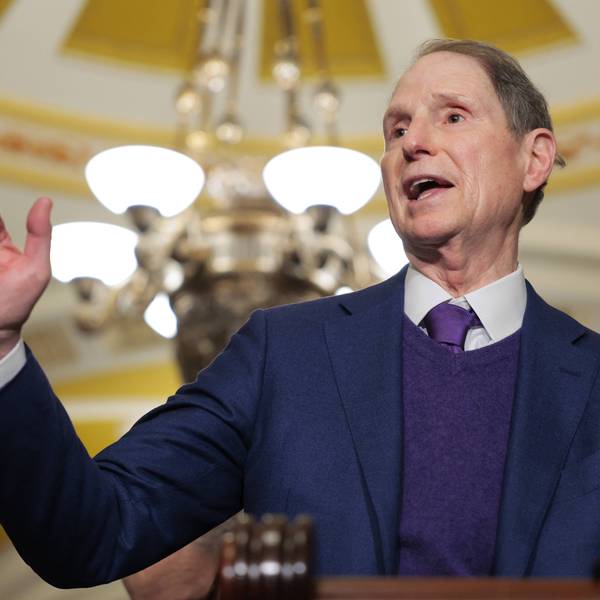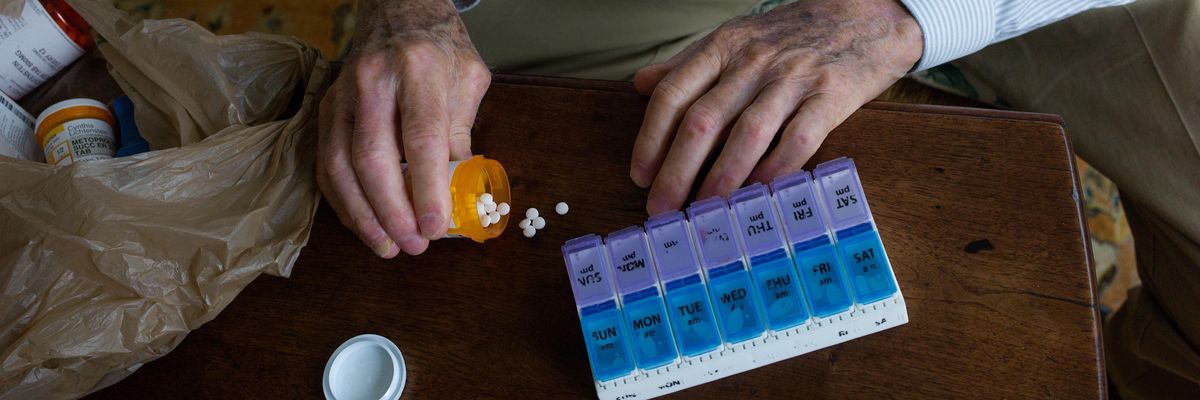A survey released Tuesday by the Alliance for Retired Americans finds that seniors overwhelmingly support allowing Medicare to negotiate prescription drug prices directly with pharmaceutical companies--so much so that a sizeable percentage would cross party lines to vote for a candidate who backs the proposed reform.
"Even in today's polarized political environment, a significant percentage of senior voters of both parties would cross party lines over this issue."
--Richard Fiesta, Alliance for Retired Americans
Conducted by the firm Lake Research Partners, the new poll (pdf) shows that 87% of voters over the age of 65--including 89% of Democrats, 87% of Republicans, and 81% of independents--support allowing Medicare to negotiate drug prices, which it is currently barred from doing under federal law.
The survey also found that 31% of Republican seniors would be more likely to vote for a Democrat who supports ongoing congressional efforts to allow Medicare to negotiate drug prices, indicating a substantial political upside for candidates who back the idea--which would lower federal spending by an estimated (pdf) $456 billion over ten years and potentially save patients thousands of dollars.
On the flip side, 55% of seniors said they would be less likely to support a Democratic candidate opposed to the popular reform, including 60% of Democratic seniors, 53% Republican seniors, and 49% of independent seniors.
Richard Fiesta, executive director of the Alliance for Retired Americans, said in a statement that the survey results "have major implications for both Democrats and Republicans in the 2022 midterm elections."
"Americans pay the highest prices in the world for prescription drugs, and they want lawmakers to take action now to lower the amount they pay at the pharmacy counter," said Fiesta. "This poll confirms that high drug prices are a top-of-mind issue for seniors when making voting decisions."
"The 2022 midterm electorate will have an outsized senior vote," he continued. "This poll highlights a risk and an opportunity for elected officials and candidates. Even in today's polarized political environment, a significant percentage of senior voters of both parties would cross party lines over this issue."
The survey came as Sen. Bernie Sanders (I-Vt.)--chair of the Senate Budget Committee--and other progressive lawmakers are pushing to include a Medicare drug-pricing provision in an emerging multitrillion-dollar reconciliation package. Senate Democratic leaders are reportedly aiming to include the provision--as well as an expansion of Medicare's benefits--in the legislation, but the details of the bill have yet to be finalized.
"It is time to end the international disgrace of Americans paying the highest prices in the world, by far, for prescription drugs," Sanders said Friday at a rally marking Medicare's 56th birthday.
Despite its popularity, the proposal is likely to run up against some opposition from Big Pharma-backed Democrats in the House. In a letter (pdf) to House Speaker Nancy Pelosi (D-Calif.) in May, a group of Democrats led by Reps. Scott Peters (D-Calif.) and Jake Auchincloss (D-Mass.) expressed opposition to H.R. 3, legislation that would empower Medicare to directly negotiate prices for a limited number of prescription drugs.
But other centrist Democrats--including some in so-called "frontline" districts at risk of flipping to the GOP in 2022--appear to have recognized the political benefits of supporting the proposal, which has broad bipartisan support across the U.S. population, not just among seniors.
In a letter (pdf) to Pelosi and Senate Majority Leader Chuck Schumer (D-N.Y.) last month, 15 House Democrats led by Rep. Susan Wild (D-Pa.) argued that "with public support of Medicare price negotiation of prescription drugs at nearly 90%, it is time to take action."
"Finally giving Medicare the power to negotiate drug prices to ensure that Americans are no longer price-gouged for life-saving medications is critical," the lawmakers wrote.




